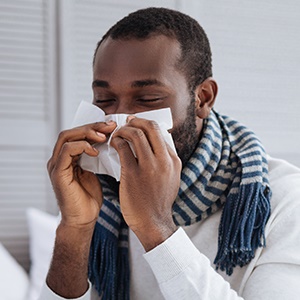
As we find ourselves on the brink of another change of season, we investigate whether over-the-counter medicine such as Allergex Non-Drowsy tablets can be used to treat seasonal allergic rhinitis. We also take a closer look at what exactly seasonal allergic rhinitis is, and whether there are ways to prevent it.
What exactly is
seasonal allergic rhinitis?
Seasonal allergic rhinitis is a condition that presents with a series of symptoms as a result of your body’s immune system displaying a sensitivity to certain allergens. These allergens usually surface in the environment at the dawn of a new season, and include the likes of pollen from grass, weeds and trees, as well as airborne mould spores. Symptoms of seasonal allergic rhinitis typically include sneezing fits and a stuffy or runny nose. Plus your eyes, mouth or skin can become itchy.¹ Seasonal allergic rhinitis is often also referred to as ‘hay fever,’ but interestingly, it is not necessarily caused by hay and you actually don’t develop a fever from it.¹
Is it contagious?
Hay fever or allergic rhinitis is not contagious, because it does not originate from bacteria or a virus.¹ In fact, it is caused by your body’s immune system responding to environmental allergens that you are breathing in.¹
Can it be
prevented?
Because there is a multitude of allergens that cause seasonal allergic rhinitis or hay fever, it is not always possible to completely avoid it.¹
There are however a number of ways in which you can reduce exposure to these allergens in high pollen seasons, such as:
- Closing the windows of your car and home and using air-conditioning instead¹
- Avoiding time outdoors, when it is very windy¹
- Putting on sunglasses to protect your eyes, when you have no choice but to be outside¹
- Wearing a pollen mask, when you do gardening and taking anti-allergy medicine beforehand¹
- Using mite-proof bedding to limit dust mites¹
- Utilising a dehumidifier to reduce mould spores ¹
Hay fever facts
that are not commonly known
Hay fever or allergic rhinitis can also cause a league of other issues, such as:
- Concentration problems¹
- Poor hand-eye coordination¹
- Limited ability to participate in activities¹
- Reduced capacity to make decisions¹
- Memory issues¹
- Irritability¹
- Sleep disorders and fatigue¹
For this reason, hay fever or seasonal allergic rhinitis should never be taken lightly.
What are the
best ways to treat it?
Antihistamines are commonly used to treat symptoms of hay fever or allergic rhinitis, because it counteracts the irritating effects of histamine, which is the chemical that is released in your body when you have an allergic reaction to an element.¹
The general consensus is that time-released antihistamines are more effective for long-term use, such as when you are exposed to allergens for several weeks or an entire pollen season.¹ A dose taken early, regularly, or as a preventative measure even before symptoms develop, is also found to be most efficient in the treatment of seasonal allergic rhinitis.¹
Is Allergex
Non-Drowsy suitable to treat hay fever or seasonal allergic rhinitis?
Allergex Non-Drowsy effectively addresses the above-mentioned treatment prescriptions for seasonal allergic rhinitis, for the following reasons:
- It is indicated for the relief of symptoms associated with seasonal allergic rhinitis and chronic urticaria²
- It contains Loratadine, which is a long-acting piperidine antihistamine and a second generation H1 antagonist²
- One only needs to take one tablet daily²
- It reaches peak plasma levels within one and a half hours, and the clinical effect is achieved within two hours²
References:
1. American College of Allergy, Asthma and Immunology. Allergic Rhinitis. Updated on 02/06/2018. Accessed on 05/02/2019. Available at: https://acaai.org/allergies/types/hay-fever-rhinitis
2. Adcock Ingram. Allergex® Non Drowsy packaging insert approved 6 February 2004.




 Publications
Publications
 Partners
Partners









